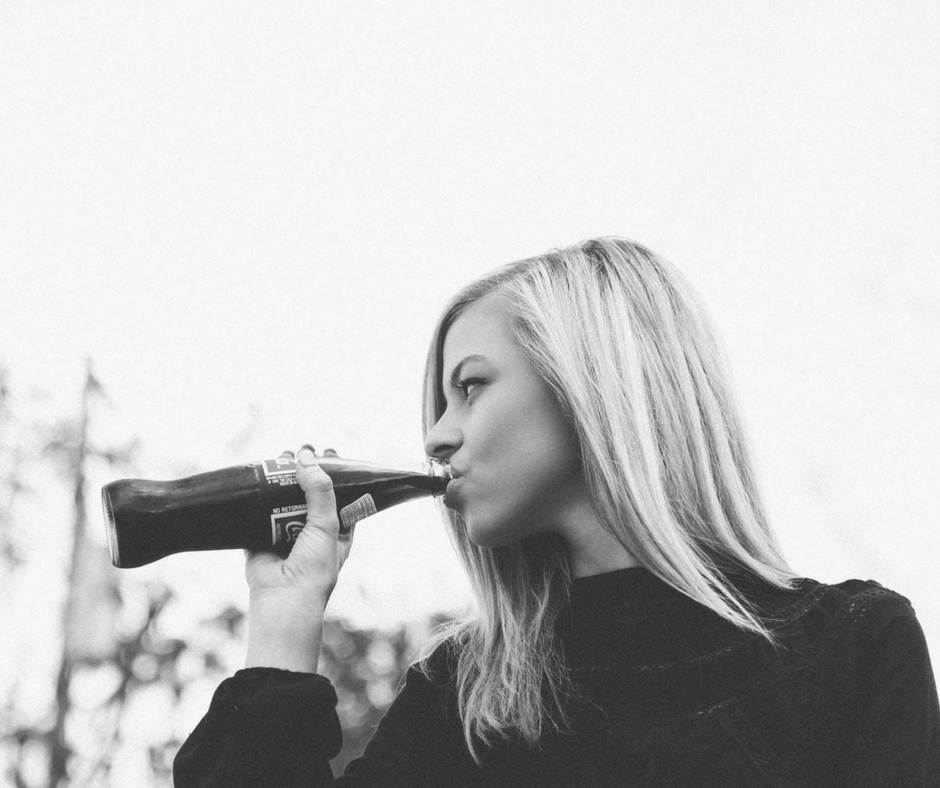Don’t Drink Your Calories

Many of us have heard the expression that “all calories are not created equal,” and it pretty much makes sense when you’re comparing 300 calories of carrots to 300 calories of cake. But, apparently, the weight-gaining effects of calories on the body differ depending on whether someone is drinking their calories or shoveling them in. Studies show that between solid foods and beverages, the consumption of liquids packs the greater girth-generating wallop. Who’d’a’thunk?
Somewhere along the line, the exhortations to drink plenty of water throughout the day (see blog post here) got translated into drinking all sorts of beverages that, by both their nature and their ingredients, are wreaking havoc on people’s weight.
Not surprisingly, sugar-laden sodas are the primary villain. Researchers found that volunteers drinking at least one serving per day of sugar-sweetened drinks gained more than twice the weight of those avoiding them: specifically, 10.3 pounds over a four-year period versus an average of only three pounds.
Another study found that by drinking one less serving of sugary soda per day, participants saw an average weight loss of 1.1 pounds in six months and 1.54 pounds in 18 months. There could be many reasons for this. One is the discovery that the caloric intake of sugar-packed soft drinks doesn’t diminish a diner’s appetite. In fact, just the opposite happened to study volunteers who found themselves downing even more food. And, of course, with the result of weight gain comes other problems. It was found that, when compared to women who drink less than one sugary drink per month, women who consume one sugar-sweetened soda per day are 83 percent more likely to develop diabetes.
While many of us already avoid drinks that list sugar as its number one ingredient, the presence of high-fructose corn syrup is just as bad. Maybe even worse. Researchers discovered that the hormones helping to signal fullness are reduced by the intake of high-fructose corn syrup, while the levels of an appetite-stimulating hormone are actually raised. Might as well just mainline calories directly into your veins!
And if you think diet sodas will come to your rescue, think again. Some artificial sweeteners have earned nasty reputations as appetite stimulants, particularly aspartame (sold as NutraSweet or AminoSweet), which has been tagged as a neurostimulator and has been linked to food allergies/sensitivities causing everything from sore muscles to migraines.
With sugar and artificial sweeteners verboten, that leaves all-natural fruit juice the healthy person’s beverage of choice, right? Well…not exactly. While nutritionally speaking, fruit juice is good for you, calorie-wise it’s not so good. Fruit juice is full of calories and sugar. See for yourself at The Calorie Counter. While the fruit sugar (fructose) in juice may be in its natural form, it’s still sugar. And when it comes to calories or raising your blood-sugar levels, sugar is sugar is sugar.
So what sweet things should you be drinking? Actually, if you can avoid any beverage that’s predominantly sweet you’re better off. The problem is that researchers have found that a sweet taste (whether real or artificial) triggers the body into thinking that a good burst of calories is about to come its way. If those calories aren’t delivered as expected, the brain tells the eater to find something quickly that will satisfy the stimulated craving. A pint of Ben and Jerry’s all too often does the trick.
Here at Best Day Ever, the way we keep ourselves flush with fluids is by always having a big pitcher of unsweetened iced tea handy. On those days when we absolutely need to drink something sweet, we add just a touch of fruit juice to the pitcher. We challenge each other to see who can come up with the best combo of herbal and black tea flavors. A favorite so far is a combination of vanilla honeybush, jasmine, peach and Earl Grey with a shot of raspberry juice. Delicious, thirst-quenching and oh so good for you!
